How I met Richard Denny and the ways it changed my life
We were 25 and we had decided to quit our jobs.
As I write this in 2016, Duncan and I have known each other for a quarter century. In early 2005, it was a mere 15 years, but it was still probably ten years since we knew we’d one day run a company together. In the 90s we fulfilled cliches old and new by running toy businesses (the cricket coaching camp being especially memorable) and building stuff on the internet just as it was taking off.
In the ten years that followed before we launched the company that became Distilled, we’d hire and fire for the first time (though given that the former came with practically no pay, the latter may well have been a blessing), we’d nearly get sued over our company name, we’d delete our only server and have to rebuild it from scratch.
OK — that last one was me (deleting) and Graeme (rebuilding all night). Thanks G!
Through all of it though, we’d probably sold about £1,000 of stuff (mainly websites). For our crazy plan to work, to let us do it full-time and quit our jobs, and to pay our rent, we had to be able to sell tens of thousands of pounds worth in the first year alone. For it to really work, we’d have to sell at least 100x as much as we had ever sold, and we’d have to do it every year from here on out.
There was a “business plan” (well, an Excel model) that is unfortunately lost to the sands of time. It modelled out how much we might be able to sell if we made as many cold calls as we could, converted an assumed number to meetings, sold small websites to some further assumed percentage, and built them as fast as we could.
We couldn’t even make it work on paper. The Excel model went bust.
We decided to do it anyway (see: 25, renting, no kids…).
So now it was a month or so before the big day. Our company was getting incorporated. We’d quit our jobs. It was all getting a little real. We went away on one last holiday — just the four of us (Duncan and I, and our girlfriends — who we would marry a few years later). We figured this was our last chance to go away together before throwing ourselves into startup life.
We had each saved up a few thousand pounds to see us through for as long as possible (see: 25, renting, no kids…!) and our future wives luckily still had real jobs. So we looked around for a fairly cheap option for March sun and settled on the beautiful Greek island of Kefalonia:
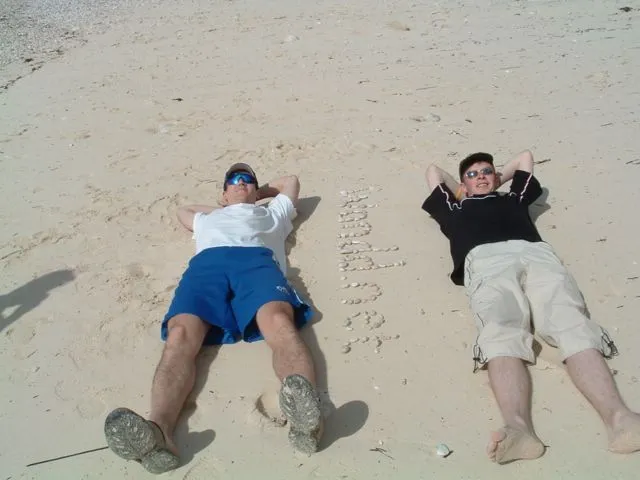

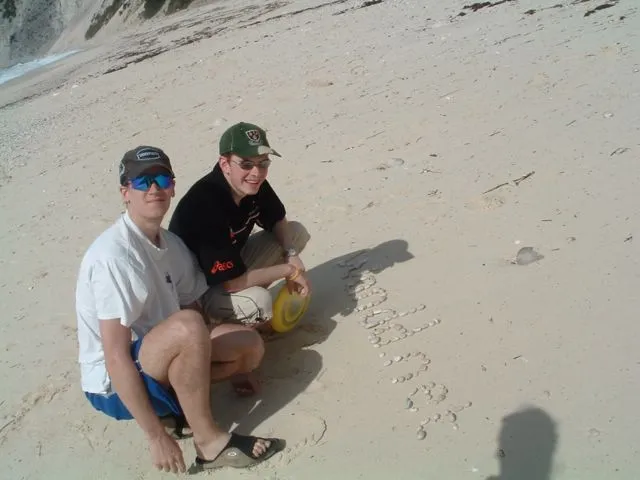
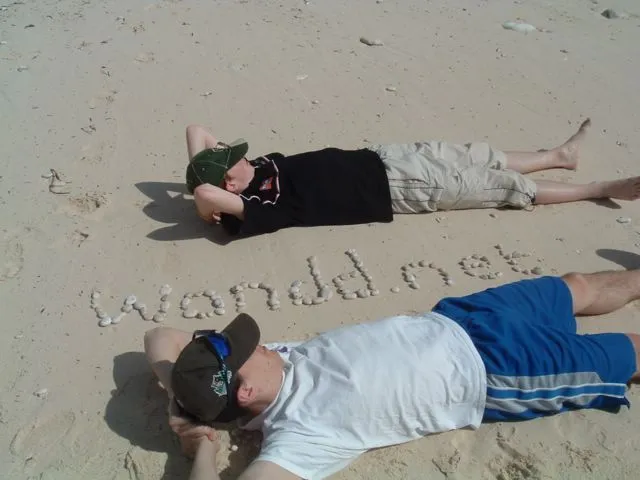
So that’s how we ended up in Gatwick airport — on our way on holiday — thinking about the fact that our futures rested on our sales abilities, and contemplating the fact that we really had no idea what we were doing (see Twilio’s “draw the owl” — and subsequent slide).
The bright green book
We wandered into the airport bookshop (back in the pre-kindle days, of course) and started browsing the business books. We thought that we would maybe pick up a book on sales and it might be useful in getting us started. The only problem was that we didn’t know what we were looking for. Luckily one stood out because it was bright green. Because we had no better way of choosing we went for that one:
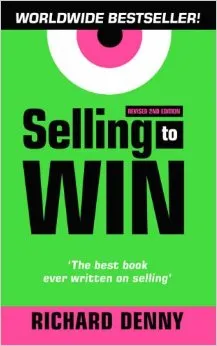
These days you can buy Selling to Win on the Kindle (Amazon US, Amazon UK) — though the cover is no longer green even on the paperback.
What we learned from Selling to Win
We both read Selling to Win in a few hours at the start of the holiday and it was a great introduction to the art and science of selling. Even though it’s over a decade since I read it, I remember one of the specific stories really well. Here it is as I remember it in my own words:
You’re trying to sell a complex office phone system. The classic way of thinking is to get the system out and start by showing the prospect all the amazing things it can do. If you’re smart about it, you’re going to make sure you focus on benefits rather than features. But there’s a better way. Leave the system in the car and ask some questions. Ask the prospect what challenges they’re facing, and what they really wish their phone system could do. Then get your system out and show them how it does exactly the things they want.
But we still had a problem.
We had picked this book based entirely on its bright green cover. We had no idea if it was legit. We had no idea if we’d learned anything useful.
Somewhere around this point I had a brainwave:
What if we tried it out on Richard Denny himself? If he doesn’t buy from us when we use his own technique, then we can’t trust anything he says.
Now. I was mainly joking. I thought that every clown that read a book on sales must turn around and try to sell their stuff to the author. It was some time later that we learned that wasn’t true; apparently no-one had ever tried it on him.
Denny’s process
It started with a letter. The letter simply asked him to take our call. The goal was just to have name recognition when you called.
I called. I probably got through to Judith but I don’t remember now.
I followed the plan and just asked for a meeting while giving up very little background.
The next week, Duncan and I caught a train at about 6am to get out to Moreton-in-Marsh for a morning meeting.
And we finally met Richard:
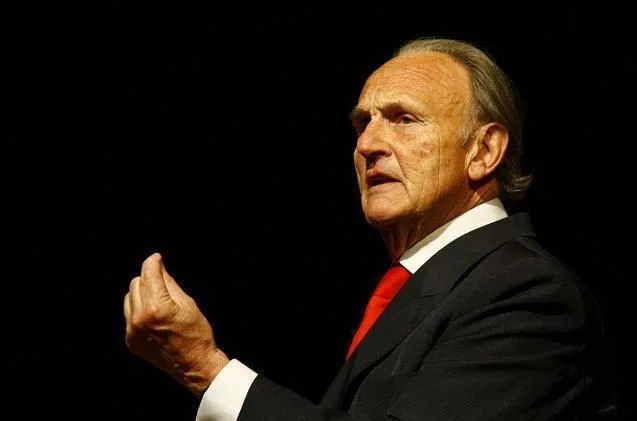
I suspect it was simply the fact that we’d used his own book against him in some kind of Judo move, but somehow, trapped by our inescapable logic, we sold some few hundred pounds-worth of work to him. I don’t now even recall exactly what that first piece of work was.
Over the subsequent years, we would go on to completely rebuild his website for him, create and promote ebooks, and advise him on all kinds of digital things.
More important than the revenue, though, was the advice.
Mentoring and growth
Over the following years, Richard would regularly let us know when he was in London, and we’d meet at the Institute of Directors.
He acted like a mentor, like an ad-hoc board member holding us to account for our promises and our plans, and like an advisor. It turns out that he hadn’t only written brightly-coloured sales books, but had also written about teamwork, motivation, leadership and more. Despite his broad experience, my abiding memory is that everything came back to sales. Specifically, I remember a few “Denny-isms”:
- Your order of priorities are: collecting cash, sending out invoices, making your sales calls, then everything else. Don’t forget to bill. Don’t skimp on the calls.
- Sales fixes everything
- Call early in the morning and late at night — that’s when the business owner answers their own phone
You can see his influence in the (literally) hundreds of letters we used to hand-address every week (because people are more likely to open their own mail if it’s hand-addressed). In the years we both spent getting up at 5.30am every week to go to BNI breakfast networking meetings. In the thousands of hours I spent walking door to door pitching our services.
Ironically, you can probably also see it in the way we dedicated much of the following decade to escaping outbound sales calls! (You can read more about that here). I still see it as the fundamentals though — like learning footwork in basketball or scales in music.
This has turned out to be one of the less-actionable posts I’ve written, but if I can extract some lessons that might be useful to others, they’d be:
- Everyone should learn sales — it’s the fundamentals of business
- Get a copy of the book (Amazon US, Amazon UK)
- Sometimes no-one has done the ballsy but obvious thing
- #hustle
[In the course of writing this post, I also came back across a bunch of dumb things we did that are quite similar to “let’s write a letter to this big-time author and try to sell him something”. 6 years before we read Selling to Win, in 1999, Tom, Duncan and I tried cold outreach to the marketing teams at Nike, Oakley and others to sell them some kind of advertising — the details are thankfully lost in the mists of time — so I guess another lesson is to persevere stupidly!]
Thank you Richard
To wrap up, I think Richard deserves a lot of credit for the 2006–2009 era of our business in particular — and without that foundation, not only would we not have built what we have over the last decade, but we wouldn’t have the fundamentals he taught us.
Thank you for believing in us. Thank you for seeing something in us that we didn’t even see in ourselves back then. Thank you for the foundation you helped us build.